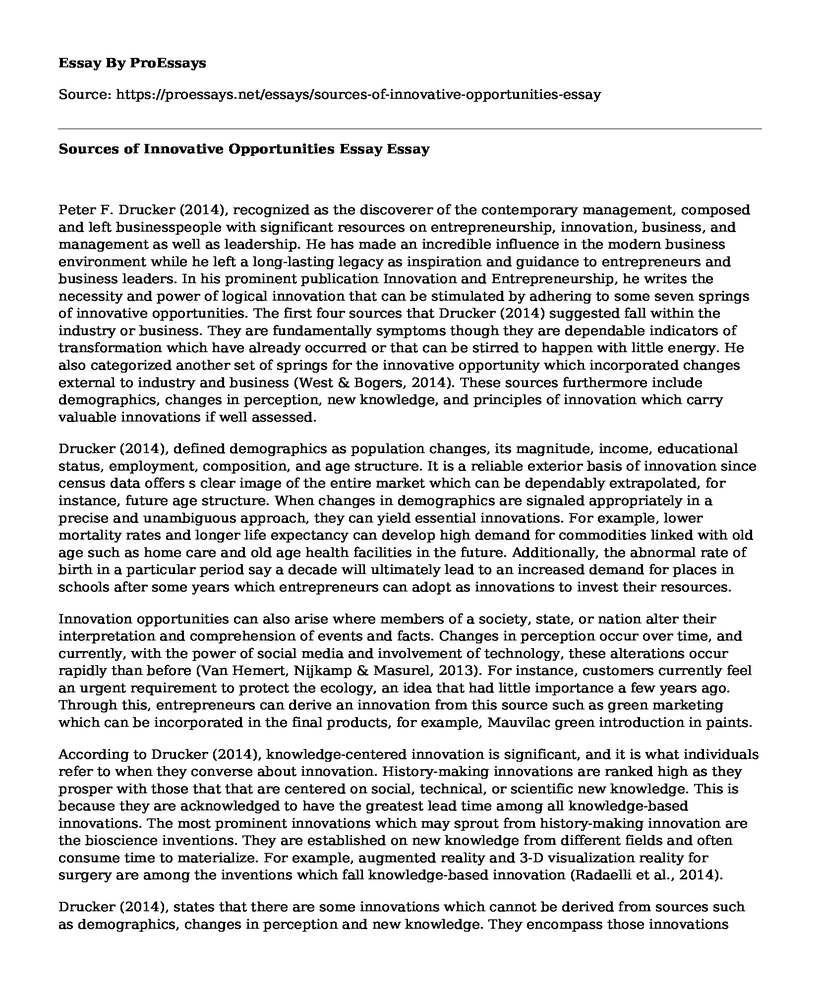Peter F. Drucker (2014), recognized as the discoverer of the contemporary management, composed and left businesspeople with significant resources on entrepreneurship, innovation, business, and management as well as leadership. He has made an incredible influence in the modern business environment while he left a long-lasting legacy as inspiration and guidance to entrepreneurs and business leaders. In his prominent publication Innovation and Entrepreneurship, he writes the necessity and power of logical innovation that can be stimulated by adhering to some seven springs of innovative opportunities. The first four sources that Drucker (2014) suggested fall within the industry or business. They are fundamentally symptoms though they are dependable indicators of transformation which have already occurred or that can be stirred to happen with little energy. He also categorized another set of springs for the innovative opportunity which incorporated changes external to industry and business (West & Bogers, 2014). These sources furthermore include demographics, changes in perception, new knowledge, and principles of innovation which carry valuable innovations if well assessed.
Drucker (2014), defined demographics as population changes, its magnitude, income, educational status, employment, composition, and age structure. It is a reliable exterior basis of innovation since census data offers s clear image of the entire market which can be dependably extrapolated, for instance, future age structure. When changes in demographics are signaled appropriately in a precise and unambiguous approach, they can yield essential innovations. For example, lower mortality rates and longer life expectancy can develop high demand for commodities linked with old age such as home care and old age health facilities in the future. Additionally, the abnormal rate of birth in a particular period say a decade will ultimately lead to an increased demand for places in schools after some years which entrepreneurs can adopt as innovations to invest their resources.
Innovation opportunities can also arise where members of a society, state, or nation alter their interpretation and comprehension of events and facts. Changes in perception occur over time, and currently, with the power of social media and involvement of technology, these alterations occur rapidly than before (Van Hemert, Nijkamp & Masurel, 2013). For instance, customers currently feel an urgent requirement to protect the ecology, an idea that had little importance a few years ago. Through this, entrepreneurs can derive an innovation from this source such as green marketing which can be incorporated in the final products, for example, Mauvilac green introduction in paints.
According to Drucker (2014), knowledge-centered innovation is significant, and it is what individuals refer to when they converse about innovation. History-making innovations are ranked high as they prosper with those that that are centered on social, technical, or scientific new knowledge. This is because they are acknowledged to have the greatest lead time among all knowledge-based innovations. The most prominent innovations which may sprout from history-making innovation are the bioscience inventions. They are established on new knowledge from different fields and often consume time to materialize. For example, augmented reality and 3-D visualization reality for surgery are among the inventions which fall knowledge-based innovation (Radaelli et al., 2014).
Drucker (2014), states that there are some innovations which cannot be derived from sources such as demographics, changes in perception and new knowledge. They encompass those innovations which are not established in any systematic, purposeful, and organized way but arise from the flash of genius. These are innovations which can be sourced through principles of innovations. For instance, the steam engine invented by James Watt in 1712 is one of the earliest innovation falling under this source. Other innovations which fit this source include the development of combustion and gunpowder engines.
Conclusion
Drucker can be regarded as the father of innovation due to his famous work where he categorized various sources of innovations. For instance, demographics have been seen to be the source of commodities-linked with old age such as home care as a result of lower mortality rates and longer life expectancy. Changes in perception is a source of green marketing innovation such as Mauvilac green in paints. Additionally, an invention such as augmented reality and 3-D visualization reality for surgery sprout from knowledge-based innovation. Drucker also stated unique innovations that can only be sourced from principles of innovation since they are flash of genius in nature such as the invention of gunpowder engines. Therefore, modern entrepreneurs and businesspeople should embrace Drucker's works in their entrepreneurship and operations to ensure they formulate and develop business ideas which are profitable and viable. This can only be possible if such ideas are derived from demographics, changes in perception, new knowledge, and principles of innovation sources of inventions.
References
Drucker, P. (2014). Innovation and entrepreneurship. Routledge.
Radaelli, G., Lettieri, E., Mura, M., & Spiller, N. (2014). Knowledge sharing and innovative work behavior in healthcare: A microlevel investigation of direct and indirect effects. Creativity and Innovation Management, 23(4), 400-414.
Van Hemert, P., Nijkamp, P., & Masurel, E. (2013). From innovation to commercialization through networks and agglomerations: analysis of sources of innovation, innovation capabilities and performance of Dutch SMEs. The Annals of Regional Science, 50(2), 425-452.
West, J., & Bogers, M. (2014). Leveraging external sources of innovation: a review of research on open innovation. Journal of Product Innovation Management, 31(4), 814-831.
Cite this page
Sources of Innovative Opportunities Essay. (2022, Jul 05). Retrieved from https://proessays.net/essays/sources-of-innovative-opportunities-essay
If you are the original author of this essay and no longer wish to have it published on the ProEssays website, please click below to request its removal:
- Internet and Its Effect on Privacy Essay
- Business Laws and Regulations in Canada Essay
- Questions and Answers on Human Resources Management
- Stages of Change Management Essay Example
- Operational Management: Roles, Techniques & Strategies - Essay Sample
- Research Paper on Project Management and Leadership: Keys to Project Success
- Essay Example on Activity-Based Costing: Enhancing Production Chain Efficiency







